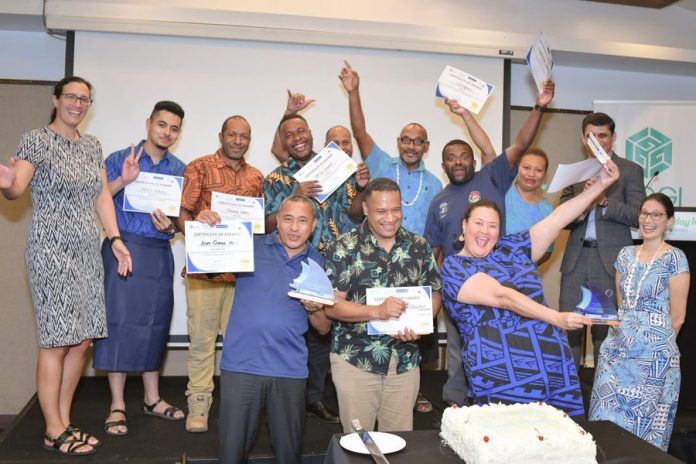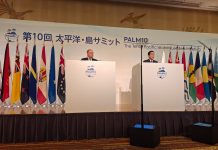On World Ocean Day, we are highlighting the importance of the ‘blue economy’ in the Pacific Islands, as well as the regional innovators EIT Climate-KIC is supporting.
Oceans and the marine economy are often associated with traditional activities such as fishing or transport. However, the emergence of a more complex ‘blue economy’ shows that oceans’ contribution to the global economy is far more substantial, as highlighted by the UN’s Ocean Decade.
A rapidly-growing sector, the blue economy has an estimated yearly turnover between US$3 and US$6 trillion, and contributes to around 260 million jobs worldwide. An increasing number of innovative sectors are addressing maritime activities, including renewable maritime energy, aquaculture, desalination and waste disposal management.
Oceans support many livelihoods and are also climate regulators, absorbing, storing and releasing CO2 worldwide. This is why oceans’ fragility needs to be addressed alongside their economic potential – especially in areas sensitive to climate impacts, such as the Pacific Islands.
Adapting to a rapidly-changing climate in the Pacific
“Although the Pacific is one of the lowest carbon-emitting regions globally, it has the highest level of climate-vulnerable communities,” says David Watt, Strategic Programmes Builder for Entrepreneurship Solutions and Ventures at EIT Climate-KIC. “All aspects of their economy have been tied to the ocean and tourism, but climate change is now impacting their communities’ entire livelihoods.”
From Kiribati to Tuvalu and the Marshall Islands, climate change is significantly impacting the Pacific Islands. In 2015, Cyclone Pam caused widespread devastation in Vanuatu, destroying homes and infrastructure, and leaving tens of thousands of people homeless. In 2016, the Great Barrier Reef mass bleaching event led to a significant loss of coral near Kiribati, threatening the health of coral reefs and the fish populations they support.
In 2020, Cyclone Harold caused extensive damage to homes and infrastructure in Fiji, resulting in the displacement of thousands of people. In the same year, rising sea levels caused by climate change led to the flooding of several coastal communities in the Solomon Islands.
These are just a few examples demonstrating the growing climate impacts in the Pacific region. Rising sea levels, increased ocean acidity, coastal erosion, flooding and storms are contributing to environmental degradation, economic disruption and increasing existing challenges faced by local communities.
With its experience in accelerating start-ups providing solutions for the blue economy, EIT Climate-KIC is now launching a new programme, supporting local stakeholders to build green entrepreneurship ecosystems in the region.
Climate Launchpad programme now open to Pacific Islanders
The world’s largest green business ideas competition, ClimateLaunchpad supports new cleantech startups creating innovations which help build local resilience.
“Having locally-grown solutions that simultaneously build climate adaptation and support the local economy is much more beneficial than bringing in a solution from Europe or elsewhere,” says David Watt. “It strengthens the local ecosystem, creates jobs and supports livelihoods.”
Given the inevitability of some climate impacts, Pacific Island nations need to develop and implement adaptation measures to help communities cope with changes already underway. From strengthening coastal infrastructure, to improving water management practices, and supporting community-led adaptation initiatives, there are a lot of potential solutions.
However, support for funding and capacity-building is missing. The region faces major barriers to accessing blue economy finance, which limits small businesses who often need to move to Australia or New Zealand to further develop – leading to a local ‘brain drain’.
This is why EIT Climate-KIC wants to support entrepreneurs at the forefront of creating local climate innovations.
Innovators in Papua New Guinea and Vanuatu can already apply to ClimateLaunchpad, while entrepreneurs from other Pacific Island countries such as Fiji will be able to apply soon.
Building on work supporting local blue economy entrepreneurs
The ClimateLaunchpad programme builds on the successful Blue Economy ClimAccelerator in the Pacific Islands. Launched last year, this was the first EIT Climate-KIC accelerator scaling up climate solutions in the region.
Supported by Irish Aid, in partnership with Global Green Growth Institute (GGGI), tailored business plans and funding were provided to ten start-ups across the region.
The selected companies focus on coral tourism and restoration, ocean waste and recycling, desalination, seaweed and sea cucumber farming, organic fertilisers, as well as carbon sequestration mangroves.
Leading the way on sustainability and conservation in the Pacific region, we look forward to seeing how these innovative enterprises develop.
Further supporting blue economy ventures in the Pacific Islands – and beyond
Our commitment to oceans in the region continues to rise – we will be undertaking an Ecosystem Report for the Pacific Islands later this year, and our flagship ClimateLaunchpad programme will be taking place in the Pacific Region for the first time in 2023.
Taking a look at the status of climate entrepreneurship across the region, the Ecosystem Report will identify barriers and opportunities for organisations in this sector. It aims to contribute to a flourishing ecosystem for innovators in the Pacific Islands.
Looking to the future, EIT Climate-KIC and our partners want to continue expanding our support for innovation leading to a sustainable blue economy – particularly in areas of high climate vulnerability like the Pacific Islands.
Help us become a strategic blue economy partner – if you would like to learn more or join us to build a global, sustainable blue economy – please contact David Watt, Strategic Programmes Builder for Entrepreneurship Solutions and Ventures at EIT Climate-KIC.
SOURCE: EIT Climate-KIC/PACNEWS


















